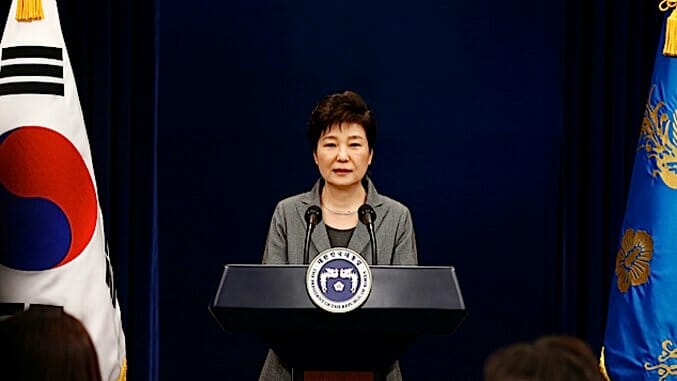Untangling South Korea’s Bizarre, Sprawling Corruption Scandal
Photo courtesy of Getty
Every weekend of this month, enormous protests have shut down central Seoul. The demonstrations stretch for several kilometers from the gates of the old royal palace and past City Hall. The protestors march in flowing, peaceful battalions, chanting and singing, waving candles and signs. It feels more like a festival than a protest. Young people, old people, high school students, farmers, office workers, mothers with toddlers in prams, all united in a single demand. ‘President Park – resign!’
Even for the most conspiracy-prone individual, the scandal engulfing South Korea is unfathomably bizarre, a multi-level maze of embezzlement and extortion involving the president’s best friend, a mysterious cult, and a crew of small-time hucksters and crooks who appear to have been running the government from behind the scenes.
However the scandal is explained, it starts with President Park Geun-hye – the democratically elected daughter of a former dictator – and her closest friend and confidant, a woman named Choi Soon-sil. Using her access to – and influence over – the president, Choi is alleged to have extorted more than $60 million dollars from Korea’s largest conglomerates in the form of charitable donations.
The scandal began with investigations into two charitable foundations run by Choi. Strangely, the foundations sprang up overnight, registered and approved in a single day, and immediately flooded with donations from corporations like Samsung, Hyundai and LG. Meanwhile, the Korean media was drawn to large campus protests at the prestigious Ewha University, whose students were protesting the admission of a young woman never attended classes yet received fantastic grades for papers that might have been written by a child. The student was Choi Soon-sil’s daughter.
Questioned about her connection to this mysteriously wealthy woman, President Park denied having any dealings with her in recent years. A few days later, reporters from a local cable news channel uncovered a laptop from Choi’s recently vacated office. On the laptop, totally unencrypted and unsecured, were drafts of presidential speeches and hundreds of policy documents, all containing memos and revisions by Choi. Park had lied. And a woman largely unknown to the public, with zero security clearance, was reviewing top secret policy documents and making changes to presidential speeches. Choi claimed that laptop wasn’t hers. It was filled with her selfies.
Again, to put this in American terms, this is bigger than Hillary Clinton’s emails. This is President Obama sending a draft of the Iran nuclear deal to a college roommate via a Hotmail account with the password ‘Obama1234.’
As the scandal has unfolded, the details have become more lurid, more compelling, more pathetic. One of Choi’s closest associates, Cha Eun-Taek, a high-flying director of K-pop music videos, has been quietly running the Ministry of Culture like a private business, redirecting large sums of public money to various personal projects. No avenue of enrichment was too small or petty for Choi and her associates. Choi even took charge of designing the presidential wardrobe, assigning the task to her lover, a male host bar waiter (of the topless kind). The cheap look of the president’s accessories and clothes did not escape the public’s attention.
-

-

-

-

-

-

-

-

-

-

-

-

-

-

-

-

-

-

-

-

-

-

-

-

-

-

-

-

-

-

-

-

-

-

-

-

-

-

-

-








































